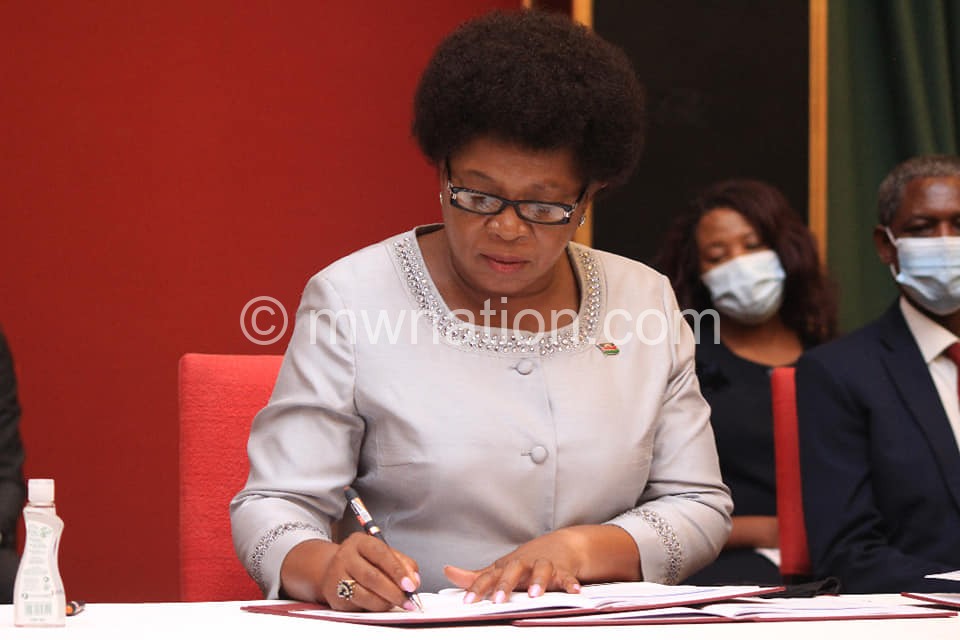Chakwera ties reforms to ministers’ appraisal
President Lazarus Chakwera has said Cabinet ministers’ performance will be tied to reforms targets given to government ministries, departments and agencies (MDAs) in signed contracts.
Commentators have since hailed the decision, saying it will force ministers to perform to the expected standards.

Speaking at Kamuzu Palace in Lilongwe yesterday when Cabinet ministers signed the reforms contracts, the President warned them that he will use the reforms to assess their quarterly performance.
He said: “I want all of you who are members of Cabinet to know that the terms of these contracts will form part of your evaluation during the first quarter of the new year. Malawians have no appetite for keeping in office government officials who have no interest in effecting the reforms agenda.”
By signing the contracts yesterday, all 22 ministries and 134 public institutions committed to implement the reforms spearheaded by Vice-President Saulos Chilima with the aim of improving efficiency in public service delivery.
Chakwera said the ministers will be directly responsible for implementation of reforms in their ministries.

Said the President: “There is a tragic component to the situation we have allowed to prevail. It lies in the fact that our resistance to reforming the public sector is depriving students in our schools of quality education; our resistance to reforming the public sector is depriving patients in our hospitals of medical supplies and personnel.
“Without committing ourselves to standards of reform as we have done today, we would be undermining the transformation that Malawians voted for five months ago. One of the main reasons our elections regularly produce a change of government without producing a change of governance is because the public service is largely unresponsive to the will of the people.”
Some of the ambitious targets in the reforms agenda include plans to establish secondary cities, boost power and water supply and reinvigorate the agriculture sector.
Under the reform targets in the agricultural sector, government intends to facilitate the establishment of a fertiliser manufacturing plant, turnaround the fortunes of the Agricultural Development and Marketing Corporation (Admarc) to achieve financial sustainability, Chilima said.
According to the Vice-President, who is also Minister of Economic Planning and Development and Public Sector Reforms, the reform areas in the agriculture sector aim to increase volumes of fertiliser produced in Malawi while Admarc becomes a financially sustainable company which maintains its social objectives.
In the energy sector, the target is to make both Electricity Supply Corporation of Malawi and Electricity Generating Company efficient.
Chilima added that government will introduce an automated payment system to deal with inefficiencies in pay management processes in MDAs, fight fraud and improve revenue collection.
Meanwhile, University of Malawi’s Chancellor College-based political analyst Mustafa Hussein said Chakwera’s decision to assess Cabinet ministers based on their successful implementation of reforms is a good dif it has sanctions attached.
He said: “This can be a good initiative as long as sanctions and rewards are attached. What will happen if somebody does not perform in the absence of sanctions? Politics can come to play if the President will use the agreement to punish the person. But this depends on what is in the agreement.
On his part, politician cum-commentator Humphreys Mvula said this decision will force Cabinet ministers to perform to the expected standards.
But he said the issue of reforms needs to be popularised to everybody including grass roots so that they too should buy and embrace those reforms.
Said Mvula: “This is something that will motivate Cabinet ministers to perform because they have set parameters for achievement. But ministers need to go beyond signing the charter. They should ensure that this is taken to the grass roots. Everybody must take ownership of these reforms.”
Chakwera, in June this year, said his first Cabinet was provisional and would be assessed after six months.
His statement was in response to concerns that appointment of the Cabinet failed to meet the 50:50 gender representation requirement and that it was based on loyalty, with some members being related or spouses.
But presidential press secretary Brian Banda in an interview yesterday said the ministers performance will still be reviewed at end of the six-months and the reforms will be an additional yardstick.
He said: “There will be two reviews, June to December which the President promised earlier, but also the one on reforms. All the President was trying to say was that the reforms are now part of the assessment of the ministers.”
Chilima first championed the reforms agenda under former president Peter Mutharika’s regime, but was later removed after falling out with the then governing Democratic Progressive Party.





